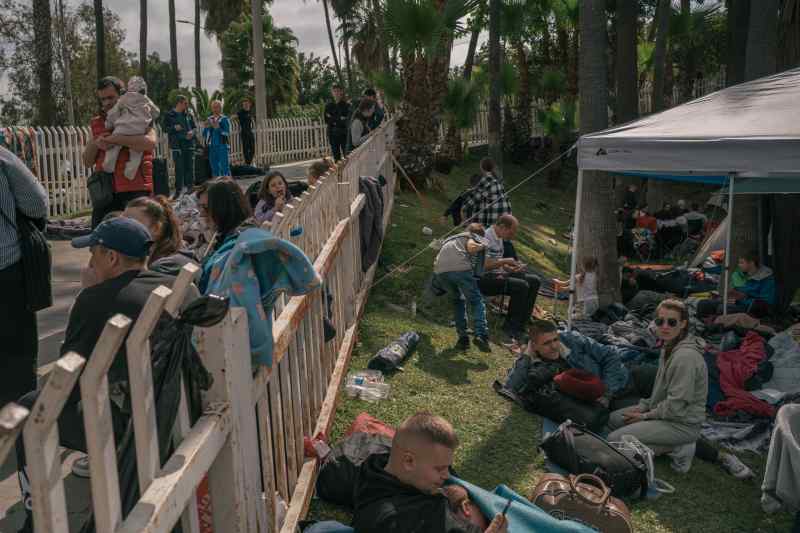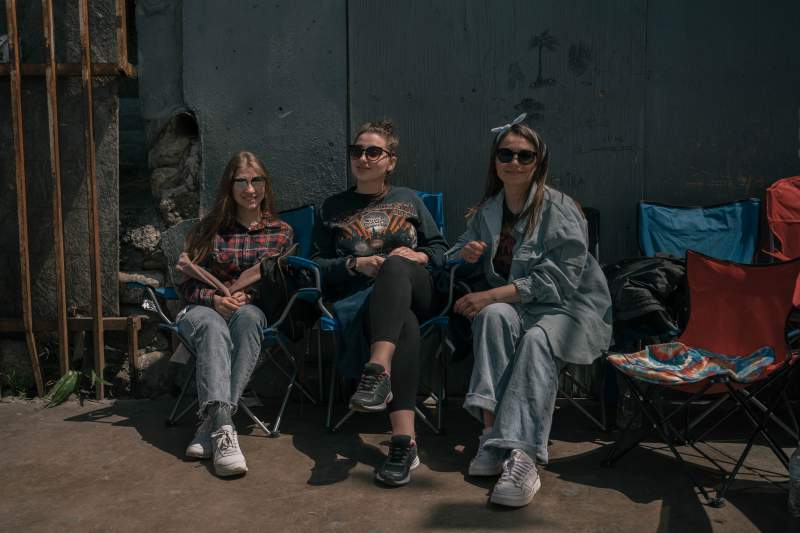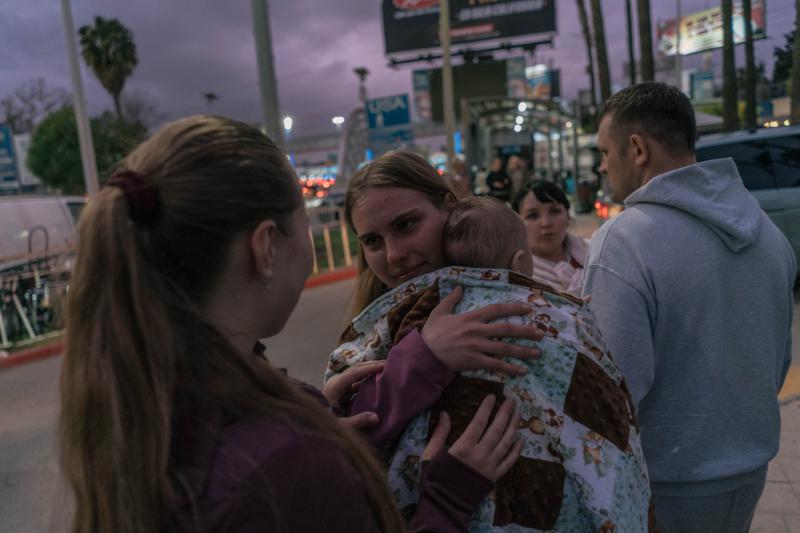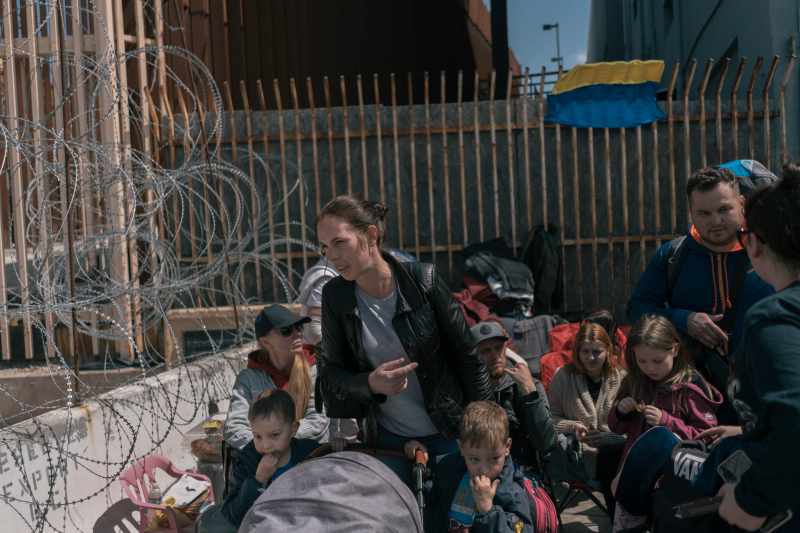
Ukranian refugees rest at an encampment near the San Ysidro Port of Entry border crossing bridge in Tijuana, Mexico.
16:01 JST, April 3, 2022
TIJUANA, Mexico — The list of Ukrainian refugees waiting to enter the United States is kept on a yellow legal pad on a folding table inside a blue camping tent, a few feet away from the multilane highway that connects Mexico to the United States.
It is written in English and Cyrillic by volunteers, many refugees themselves, waiting for their own numbers to be called.
“They said it could be two or three days,” said Valentina Shymanservska, No. 884, a sunflower farmer from outside Kharkiv.
“My turn is any minute,” said Svyastoslav Urusky, No. 319, a university student from Lviv.
“I can’t believe we’re still waiting,” said Maxim Polosov, No. 363, who renovated homes in Slovyansk.
By Saturday morning, the list had more than 1,200 names on it. Dozens more Ukrainians were arriving every hour. A van was shuttling them between the Tijuana airport and the tent where the yellow legal pad was kept.
“The list,” people began calling it in Tijuana, which required no elaboration.
The United States last month committed to accepting as many as 100,000 Ukrainian refugees, but it has yet to establish a way for them to arrive directly. There are no resettlement programs or visa pipelines. That has left Ukrainians in growing numbers to book flights to Mexico. They arrive at the U.S. border on foot, many pushing kids in strollers and dragging suitcases behind them.
On social media platforms and messaging apps, groups with thousands of members now explain the process in the Ukrainian language: From major European cities, fly to either Cancún or Mexico City. Ukrainians don’t need visas to enter the country. From there, take another flight to Tijuana.
A small encampment has sprouted about 1,000 feet from the U.S. border, where families are sleeping in tents and under tarps. It is the same tiny patch that has hosted refugees from around the world in recent years: Central Americans who were part of the caravans in 2018; Haitians and Cubans who arrived during the pandemic; Mexicans who fled a surge in violence this year.
But few refugees have arrived in Tijuana after such a circuitous trajectory of trains, buses and flights. And few are processed as quickly by U.S. authorities. Upon arriving at the border, Ukrainians are granted humanitarian parole for one year.

Tatiana Pylypchuk (25), Elizabeth Babiychuk (22), and Maria Verkovska (27), Ukranian refugees, pose for a portrait as they wait to enter to cross the San Ysidro Port of Entry border crossing bridge in Tijuana.
Mariia Verkovska, 27, and her two friends — Nos. 299 to 301 — traveled through nine countries in 10 days after leaving Ukraine in late February. They eventually ended up in Finland, where Verkovska joined a Telegram channel called “Ukraine Mexico.” They borrowed $1,300 each for flights to Tijuana via Brussels and Cancún.
Most of their families had remained behind in northeastern Ukraine. Their brothers and fathers were forced to join the country’s fighting force. Their mothers and sisters mostly chose to not to leave. Some of them — in towns occupied by Russia — had no choice.
“We wanted to get as far away from Ukraine as we could, and the United States is as far as we could think,” Verkovska said.
Others ended up in Tijuana because their relatives were U.S. citizens or residents who had been calling for them to come since the war began in February. There are about 1 million Americans of Ukrainian descent living in the United States.
No. 658 on the list was a 10-year-old boy named Yshor and No. 659 was a 14-year-old girl named Taisia. Their aunt, Tanya Malko, had traveled from her home in Tampa, to pick them up in Ukraine after the children’s mother had decided to stay behind in the city of Chernihiv.
“Are they going to let us stay together after the children cross the border?” Malko asked. She had heard stories of U.S. immigration officials separating children from relatives who the officials claimed were not legal guardians.

Mariia Porplenko (19), an Ukranian refugee, holds her 8 months old niece who lives in the U.S for the first time as she arrives to the encampment near the San Ysidro Port of Entry border crossing bridge in Tijuana.
No. 698 was Mariia Porplenko, 19, from Hostomel, whose sister had driven from West Virginia to Tijuana to meet her. Porplenko had started a job in her city’s McDonald’s just before the war began. The sisters embraced in front of Farmacia La Linea, the lights of one of the world’s busiest border crossings flashing behind them.
No. 612 was Gleb Prochukhan, 15, the No. 3-ranked junior table tennis player in Kharkiv, whose English was good enough to translate for some of the foreign volunteers who had descended on Tijuana with blankets and protein bars and tacos.
No. 673 was Luda Hodakovska from Lutsk, who ate the first taco of her life on Friday night in Tijuana and exclaimed after her first bite: “Oh my God, this is super.”
Tijuana was often indifferent to the iterations of migrants and refugees who arrived here. But the support for Ukrainians was immediate.
“We will work together so you can achieve your dream,” said the city’s mayor, Montserrat Caballero, when she visited the encampment on Thursday. “Welcome to Tijuana.”
On Friday evening, one woman serenaded the refugees while strumming an acoustic guitar. An inebriated American man handed hundreds of dollars in cash to a Ukrainian American volunteer, cursing out Russian President Vladimir Putin as he distributed the money.
“I love Ukrainians,” he slurred.
No. 319 was 21-year-old Svyastoslav Urusky, from Lviv, whose grandparents lived in Sacramento and were waiting for him on the other side of the border crossing.
Like many of the Ukrainians in Tijuana, Urusky had visited U.S. embassies and consulates in European capitals after leaving Ukraine, inquiring about a path to refugee status in the United States.
“They told us, ‘Sorry, we don’t have any options for you yet,'” Urusky recounted an embassy official in Poland saying.
So he and his family, after reading the guidance on a Telegram channel, booked flights to Mexico. At 1 p.m. on Friday afternoon, his number was called.
“We’ve got space for one more family,” a U.S. immigration officer had said on the other side of the barbed wire, next to where Urusky was sitting in a folding chair. Standing up, he grinned.

Ukranian refugees wait to cross the San Ysidro Port of Entry border crossing bridge in Tijuana.
One of the volunteers who managed the list was Anna Zinchenko, a Ukrainian-American nurse who drove to Tijuana from Spokane, Wash. She tried to decide which families to prioritize, who should rise to the top of the list because of a medical condition, or because their children got cold when the temperature dropped at night.
“It was too much pressure,” Zinchenko said. “I’m a soft person. Keeping control of the list was too much for me.”
At the Tijuana border crossing, U.S. officials have given orders that only Ukrainians can be put on the list. A policy known as Title 42, due to be lifted in May, has prevented asylum seekers from crossing the border to make their claims since the beginning of the pandemic. It has been used in about 1.7 million migrant expulsions over the past two years.
On Friday, a family of Honduran asylum seekers, turned away at the border, passed by the Ukrainian encampment to ask for small change.
U.S. officials have carved out an exemption to Title 42 for Ukrainians. But many Russians are fleeing simultaneously, including some with Ukrainian relatives. No. 939 was a Ukrainian woman whose 18-year-old son had a Russian passport.
“Will they let us across?” she asked a volunteer. No one could answer.
Valentina Shymanservska, number 884, owns a farm near Kharkiv. She looked up at the trees growing along the highway next to the encampment.
“Yucca,” she said.
Her 2-year-old grandson, Danylo, was playing next to her. He and Shymanservska’s daughter, Alina, had narrowly escaped the town of Shevchenko in eastern Ukraine, which had been heavily shelled and mined by Russian forces. Danylo now gasped at loud noises. They had left Ukraine only seven days ago.
Every Ukrainian in Tijuana had a different idea of how long they would stay in the United States. Some said they were planning to migrate permanently. Others said they would leave after their one-year humanitarian parole expired.
Shymanservska had her own plan.
“Two weeks,” she said. “That’s how long I’m planning to stay. The first day they tell me the war is over, we will go back.”
Her daughter and her newborn grandson had driven from Marysville, Wash., to greet her on the other side of the border.
“That’s all I’m thinking about now,” she said. “Holding both of my grandchildren, one in each arm.”
Top Articles in News Services
-

Survey Shows False Election Info Perceived as True
-

Prudential Life Expected to Face Inspection over Fraud
-

Hong Kong Ex-Publisher Jimmy Lai’s Sentence Raises International Outcry as China Defends It
-

Japan’s Nikkei Stock Average Touches 58,000 as Yen, Jgbs Rally on Election Fallout (UPDATE 1)
-

Japan’s Nikkei Stock Average Falls as US-Iran Tensions Unsettle Investors (UPDATE 1)
JN ACCESS RANKING
-

Japan PM Takaichi’s Cabinet Resigns en Masse
-

Japan Institute to Use Domestic Commercial Optical Lattice Clock to Set Japan Standard Time
-

Israeli Ambassador to Japan Speaks about Japan’s Role in the Reconstruction of Gaza
-

Man Infected with Measles Reportedly Dined at Restaurant in Tokyo Station
-

Videos Plagiarized, Reposted with False Subtitles Claiming ‘Ryukyu Belongs to China’; Anti-China False Information Also Posted in Japan
























